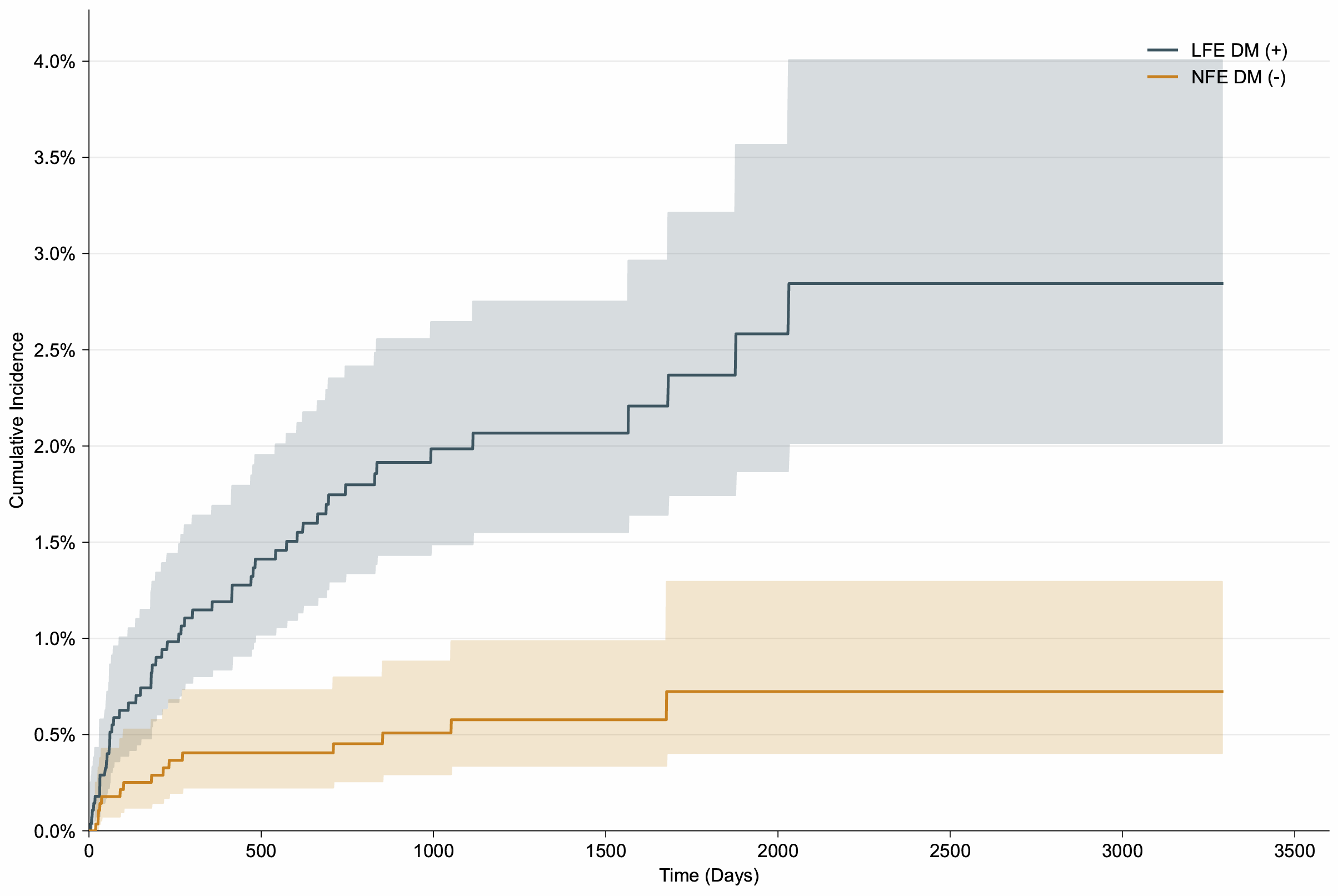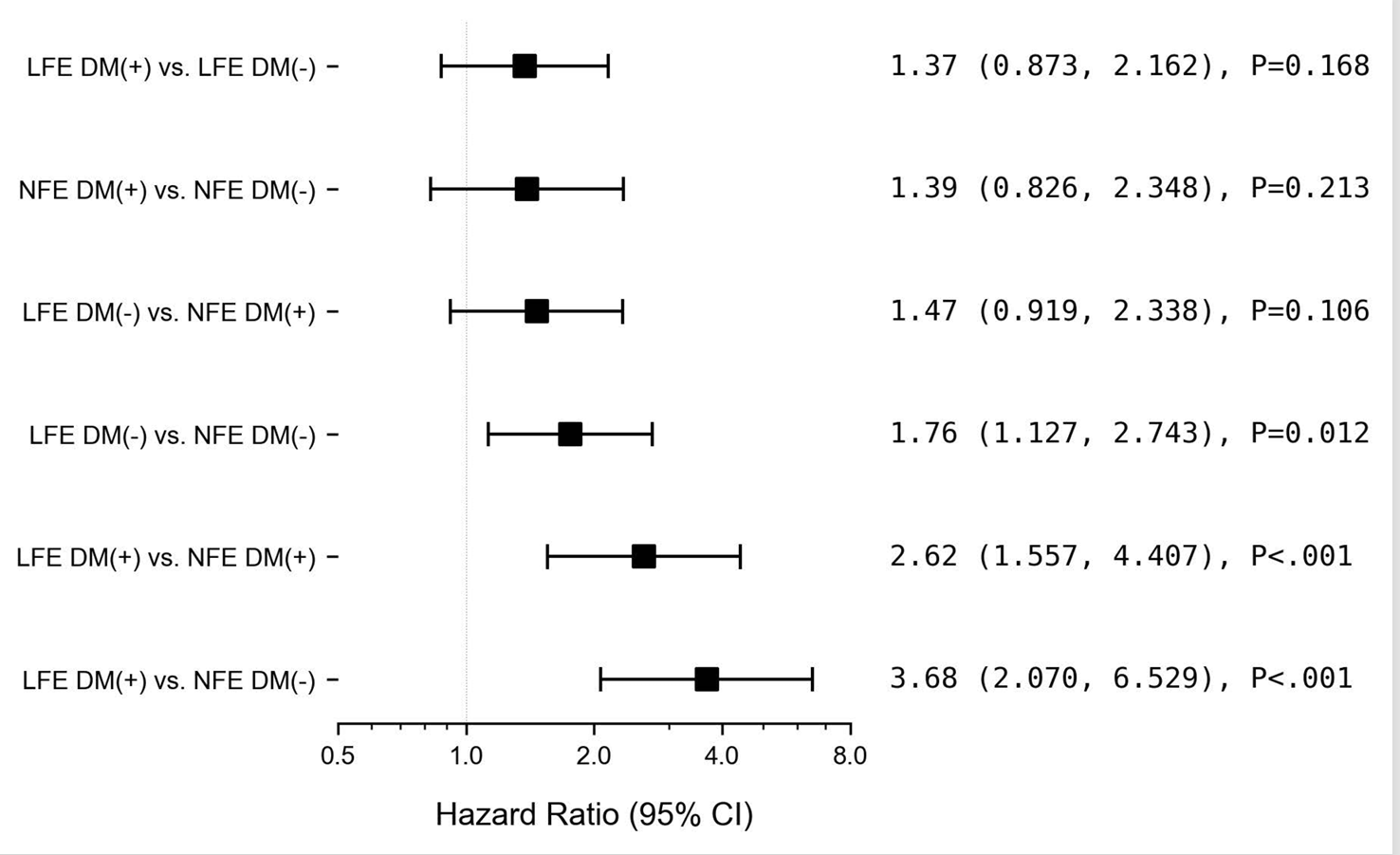Monday Poster Session
Category: Biliary/Pancreas
P2173 - The Coexistence of Diabetes Mellitus and Low Fecal Elastase Is Associated With Increased Pancreatic Cancer Risk: A Retrospective, Real-World Cohort Study
Monday, October 27, 2025
10:30 AM - 4:00 PM PDT
Location: Exhibit Hall
- CO
Chukwuemeka Ogbu, MD, MPH
Cape Fear valley Medical Center
Fayetteville, NC
Presenting Author(s)
Chukwuemeka Ogbu, MD, MPH1, Yichen Wang, MD, MSc2, Oyedotun Babajide, MD3, Chukwunonso Ezeani, MBBS4, Lekhya Kollu, BA5, Osayande Osagiede, MBBS, MPH6, Philip Okafor, MD, MPH, FACG7
1Cape Fear valley Medical Center, Fayetteville, NC; 2University of Pennsylvania, Philadelphia, PA; 3NYC Health + Hospitals/Metropolitan, New York, NY; 4Mayo Clinic, Phoenix, AZ; 5Lewis Katz School of Medicine at Temple University, Philadelphia, PA; 6Mayo Clinic, Jacksonville, FL, US, Jacksonville, FL; 7Mayo Clinic, Jacksonville, FL
Introduction: Diabetes mellitus (DM) and chronic pancreatitis are established risk factors for pancreatic ductal adenocarcinoma (PDAC). The co-occurence of exocrine and endocrine pancreatic dysfunction may increase the risk of progression to PDAC and could play a role in early detection. We sought to explore this hypothesis by comparing PDAC risk among patients with DM and low fecal elastase (FE) in a real-world cohort of patients.
Methods: A retrospective cohort study was conducted using the TriNetX research network including adults with continuous follow-up from 2016 to 2023. The cohort was stratified into four groups based on the presence or absence of DM, and normal FE ( >200 µg/g) or low FE (< 200 µg/g). The four groups included: (1) low FE and DM, (2) low FE without DM, (3) normal FE and DM, (4) normal FE without DM. We excluded patients with a history of prior PDAC or pancreas or bariatric surgery. Propensity score matching (1:1) using a nearest neighbor algorithm was performed to balance covariates including age, sex, race, comorbidities to allow for a six-way comparison of PDAC risk between groups. Time-to-event analyses were conducted with Kaplan-Meier curves and Cox proportional hazards models to estimate hazard ratios (HR) and 95% confidence intervals (95% CI) for the primary outcome of PDAC incidence.
Results: Of the study cohort, 29,207 had fecal elastase levels. Low FE (< 200 µg/g) was observed in 33% (n=9,585) of these patients. After six-way comparisons, we observed a higher PDAC risk among individuals with both DM and low FE compared to other groups (Figure 1). Among patients without DM, those with low FE had a significantly higher risk of PDAC compared with those without either condition (HR 1.76; 95% CI, 1.127–2.743; p= 0.012). The highest PDAC risk was observed in patients with both a low FE (< 200 µg/g) and DM compared to those with a normal FE and without a history of DM (HR 3.68; 95% CI, 2.07–6.53; p< .001) [Figure 2]. Sensitivity analysis using a stricter fecal elastase cutoff of < 100 µg/g showed a similar finding, with the highest hazard ratio for PDAC among patients with both DM and very low FE levels [HR 3.07, 95% CI, 1.37-6.91; p=.004].
Discussion: The coexistence of low fecal elastase and DM amplifies the risk of pancreatic ductal adenocarcinoma in our cohort of patients. These results suggest that fecal elastase values may be used to enrich the diabetic population for future PDAC risk stratification, though more studies are needed to validate these findings.

Figure: Cumulative Incidence of PDAC Over Time in LFE DM(+) vs. NFE DM(−) Groups

Figure: Forest plot showing the Coexistence of Diabetes Mellitus and Low Fecal Elastase is associated with Increased Pancreatic Cancer Risk
Disclosures:
Chukwuemeka Ogbu indicated no relevant financial relationships.
Yichen Wang indicated no relevant financial relationships.
Oyedotun Babajide indicated no relevant financial relationships.
Chukwunonso Ezeani indicated no relevant financial relationships.
Lekhya Kollu indicated no relevant financial relationships.
Osayande Osagiede indicated no relevant financial relationships.
Philip Okafor indicated no relevant financial relationships.
Chukwuemeka Ogbu, MD, MPH1, Yichen Wang, MD, MSc2, Oyedotun Babajide, MD3, Chukwunonso Ezeani, MBBS4, Lekhya Kollu, BA5, Osayande Osagiede, MBBS, MPH6, Philip Okafor, MD, MPH, FACG7. P2173 - The Coexistence of Diabetes Mellitus and Low Fecal Elastase Is Associated With Increased Pancreatic Cancer Risk: A Retrospective, Real-World Cohort Study, ACG 2025 Annual Scientific Meeting Abstracts. Phoenix, AZ: American College of Gastroenterology.
1Cape Fear valley Medical Center, Fayetteville, NC; 2University of Pennsylvania, Philadelphia, PA; 3NYC Health + Hospitals/Metropolitan, New York, NY; 4Mayo Clinic, Phoenix, AZ; 5Lewis Katz School of Medicine at Temple University, Philadelphia, PA; 6Mayo Clinic, Jacksonville, FL, US, Jacksonville, FL; 7Mayo Clinic, Jacksonville, FL
Introduction: Diabetes mellitus (DM) and chronic pancreatitis are established risk factors for pancreatic ductal adenocarcinoma (PDAC). The co-occurence of exocrine and endocrine pancreatic dysfunction may increase the risk of progression to PDAC and could play a role in early detection. We sought to explore this hypothesis by comparing PDAC risk among patients with DM and low fecal elastase (FE) in a real-world cohort of patients.
Methods: A retrospective cohort study was conducted using the TriNetX research network including adults with continuous follow-up from 2016 to 2023. The cohort was stratified into four groups based on the presence or absence of DM, and normal FE ( >200 µg/g) or low FE (< 200 µg/g). The four groups included: (1) low FE and DM, (2) low FE without DM, (3) normal FE and DM, (4) normal FE without DM. We excluded patients with a history of prior PDAC or pancreas or bariatric surgery. Propensity score matching (1:1) using a nearest neighbor algorithm was performed to balance covariates including age, sex, race, comorbidities to allow for a six-way comparison of PDAC risk between groups. Time-to-event analyses were conducted with Kaplan-Meier curves and Cox proportional hazards models to estimate hazard ratios (HR) and 95% confidence intervals (95% CI) for the primary outcome of PDAC incidence.
Results: Of the study cohort, 29,207 had fecal elastase levels. Low FE (< 200 µg/g) was observed in 33% (n=9,585) of these patients. After six-way comparisons, we observed a higher PDAC risk among individuals with both DM and low FE compared to other groups (Figure 1). Among patients without DM, those with low FE had a significantly higher risk of PDAC compared with those without either condition (HR 1.76; 95% CI, 1.127–2.743; p= 0.012). The highest PDAC risk was observed in patients with both a low FE (< 200 µg/g) and DM compared to those with a normal FE and without a history of DM (HR 3.68; 95% CI, 2.07–6.53; p< .001) [Figure 2]. Sensitivity analysis using a stricter fecal elastase cutoff of < 100 µg/g showed a similar finding, with the highest hazard ratio for PDAC among patients with both DM and very low FE levels [HR 3.07, 95% CI, 1.37-6.91; p=.004].
Discussion: The coexistence of low fecal elastase and DM amplifies the risk of pancreatic ductal adenocarcinoma in our cohort of patients. These results suggest that fecal elastase values may be used to enrich the diabetic population for future PDAC risk stratification, though more studies are needed to validate these findings.

Figure: Cumulative Incidence of PDAC Over Time in LFE DM(+) vs. NFE DM(−) Groups

Figure: Forest plot showing the Coexistence of Diabetes Mellitus and Low Fecal Elastase is associated with Increased Pancreatic Cancer Risk
Disclosures:
Chukwuemeka Ogbu indicated no relevant financial relationships.
Yichen Wang indicated no relevant financial relationships.
Oyedotun Babajide indicated no relevant financial relationships.
Chukwunonso Ezeani indicated no relevant financial relationships.
Lekhya Kollu indicated no relevant financial relationships.
Osayande Osagiede indicated no relevant financial relationships.
Philip Okafor indicated no relevant financial relationships.
Chukwuemeka Ogbu, MD, MPH1, Yichen Wang, MD, MSc2, Oyedotun Babajide, MD3, Chukwunonso Ezeani, MBBS4, Lekhya Kollu, BA5, Osayande Osagiede, MBBS, MPH6, Philip Okafor, MD, MPH, FACG7. P2173 - The Coexistence of Diabetes Mellitus and Low Fecal Elastase Is Associated With Increased Pancreatic Cancer Risk: A Retrospective, Real-World Cohort Study, ACG 2025 Annual Scientific Meeting Abstracts. Phoenix, AZ: American College of Gastroenterology.
